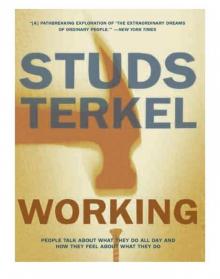- Home
- Studs Terkel
Working Page 2
Working Read online
Page 2
Others, more articulate—at times, visionary—murmur of a hunger for “beauty,” “a meaning,” “a sense of pride.” A veteran car hiker sings out, “I could drive any car like a baby, like a woman change her baby’s diaper. Lots of customers say, ‘How you do this?’ I’d say, ‘Just the way you bake a cake, miss.’ When I was younger, I could swing with that car. They called me Lovin’ Al the Wizard.”
Dolores Dante graphically describes the trials of a waitress in a fashionable restaurant. They are compounded by her refusal to be demeaned. Yet pride in her skills helps her make it through the night. “When I put the plate down, you don’t hear a sound. When I pick up a glass, I want it to be just right. When someone says, ‘How come you’re just a waitress?’ I say, ‘Don’t you think you deserve being served by me?’ ”
Peggy Terry has her own sense of grace and beauty. Her jobs have varied with geography, climate, and the ever-felt pinch of circumstance. “What I hated worst was being a waitress. The way you’re treated. One guy said, ‘You don’t have to smile; I’m gonna give you a tip anyway.’ I said, ‘Keep it. I wasn’t smiling for a tip.’ Tipping should be done away with. It’s like throwing a dog a bone. It makes you feel small.”
In all instances, there is felt more than a slight ache. In all instances, there dangles the impertinent question: Ought not there be an increment, earned though not yet received, from one’s daily work—an acknowledgement of man’s being?
An American President is fortunate—or, perhaps, unfortunate—that, offering his Labor Day homily, he didn’t encounter Maggie Holmes, the domestic, or Phil Stallings, the spot-welder, or Louis Hayward, the washroom attendant. Or, especially, Grace Clements, the felter at the luggage factory, whose daily chore reveals to us in a terrible light that Charles Dickens’s London is not so far away nor long ago.
Obtuseness in “respectable” quarters is not a new phenomenon. In 1850 Henry Mayhew, digging deep into London’s laboring lives and evoking from the invisible people themselves the wretched truth of their lot, astonished and horrified readers of the Morning Chronicle. His letters ran six full columns and averaged 10,500 words. It is inconceivable that Thomas Carlyle was unaware of Mayhew’s findings. Yet, in his usual acerbic—and, in this instance, unusually mindless—manner, he blimped, “No needlewoman, distressed or other, can be procured in London by any housewife to give, for fair wages, fair help in sewing. Ask any thrifty housemother. No real needlewoman, ‘distressed’ or other, has been found attainable in any of the houses I frequent. Imaginary needlewomen, who demand considerable wages, and have a deepish appetite for beer and viands, I hear of everywhere. . . . ”1 A familiar ring?
Smug respectability, like the poor, we’ve had with us always. Today, however, and what few decades remain of the twentieth century, such obtuseness is an indulgence we can no longer afford. The computer, nuclear energy for better or worse, and sudden, simultaneous influences flashed upon everybody’s TV screen have raised the ante and the risk considerably. Possibilities of another way, discerned by only a few before, are thought of —if only for a brief moment, in the haze of idle conjecture—by many today.
The drones are no longer invisible nor mute. Nor are they exclusively of one class. Markham’s Man with the Hoe may be Ma Bell’s girl with the headset. (And can it be safely said, she is “dead to rapture and despair”? Is she really “a thing that grieves not and that never hopes”?) They’re in the office as well as the warehouse; at the manager’s desk as well as the assembly line; at some estranged company’s computer as well as some estranged woman’s kitchen floor.
Bob Cratchit may still be hanging on (though his time is fast running out, as did his feather pen long ago), but Scrooge has been replaced by the conglomerate. Hardly a chance for Christmas spirit here. Who knows Bob’s name in this outfit—let alone his lame child’s? (“The last place I worked for, I was let go,” recalls the bank teller. “One of my friends stopped by and asked where I was at. They said, ‘She’s no longer with us.’ That’s all. I vanished.”) It’s nothing personal, really. Dickens’s people have been replaced by Beckett’s.
Many old working class women have an habitual gesture which illuminates the years of their life behind. D. H. Lawrence remarked it in his mother: my grandmother’s was a repeated tapping which accompanied an endless working out of something in her head; she had years of making out for a large number on very little. In others, you see a rhythmic smoothing out of the hand down the chair arm, as though to smooth everything out and make it workable; in others, there is a working of the lips or a steady rocking. None of these could be called neurotic gestures, nor are they symptoms of acute fear; they help the constant calculation.2
In my mother’s case, I remember the illuminating gesture associated with work or enterprise. She was a small entrepreneur, a Mother Courage fighting her Thirty Years’ War, daily. I remember her constant feeling of the tablecloth, as though assessing its quality, and her squinting of the eye, as though calculating its worth.
Perhaps it was myopia, but I rarely saw such signs among the people I visited during this adventure. True, in that dark hollow in Eastern Kentucky I did see Susie Haynes, the black lung miner’s wife, posed in the doorway of the shack, constantly touching the woodwork, “as though to smooth everything out and make it workable.” It was a rare gesture, what once had been commonplace. Those who did signify—Ned Williams, the old stock chaser, Hobart Foote, the utility man—did so in the manner of the machines to which they were bound. Among the many, though the words and phrases came, some heatedly, others coolly, the hands were at rest, motionless. Their eyes were something else again. As they talked of their jobs, it was as though it had little to do with their felt lives. It was an alien matter. At times I imagined I was on the estate of Dr. Caligari and the guests poured out fantasies.
To maintain a sense of self, these heroes and heroines play occasional games. The middle-aged switchboard operator, when things are dead at night, cheerily responds to the caller, “Marriott Inn,” instead of identifying the motel chain she works for. “Just for a lark,” she explains bewilderedly. “I really don’t know what made me do it.” The young gas meter reader startles the young suburban housewife sunning out on the patio in her bikini, loose-bra’d, and sees more things than he would otherwise see. “Just to make the day go faster.” The auto worker from the Deep South will “tease one guy ‘cause he’s real short and his old lady left him.” Why? “Oh, just to break the monotony. You want quittin’ time so bad.”
The waitress, who moves by the tables with the grace of a ballerina, pretends she’s forever on stage. “I feel like Carmen. It’s like a gypsy holding out a tambourine and they throw the coin.” It helps her fight humiliation as well as arthritis. The interstate truckdriver, bearing down the expressway with a load of seventy-three thousand pounds, battling pollution, noise, an ulcer, and kidneys that act up, “fantasizes something tremendous.” They all, in some manner, perform astonishingly to survive the day. These are not yet automata.
The time study men of the General Motors Assembly Division made this discomfiting discovery in Lordstown. Gary Bryner, the young union leader, explains it. “Occasionally one of the guys will let a car go by. At that point, he’s made a decision: ‘Aw, fuck it. It’s only a car.’ It’s more important to just stand there and rap. With us, it becomes a human thing. It’s the most enjoyable part of my job, that moment. I love it!” John Henry hardly envisioned that way of fighting the machine—which may explain why he died in his prime.
There are cases where the job possesses the man even after quitting time. Aside from occupational ticks of hourly workers and the fitful sleep of salaried ones, there are instances of a man’s singular preoccupation with work. It may affect his attitude toward all of life. And art.
Geraldine Page, the actress, recalls the critique of a backstage visitor during her run in Sweet Bird Of Youth. He was a dentist. “I was sitting in the front row and looking up. Most of the time I was studying th
e fillings in your mouth. I’m curious to know who’s been doing your dental work.” It was not that he loved theater less, but that he loved dentistry more.
At the public unveiling of a celebrated statue in Chicago, a lawyer, after deep study, mused, “I accept Mr. Picasso in good faith. But if you look at the height of the slope on top and the propensity of children who will play on it, I have a feeling that some child may fall and be hurt and the county may be sued. . . .”
In my own case, while putting together this book, I found myself possessed by the mystique of work. During a time out, I saw the film Last Tango in Paris. Though Freud said lieben und arbeiten are the two moving impulses of man, it was the latter that, at the moment, consumed me. Thus, I saw on the screen a study not of redemption nor of self-discovery nor whatever perceptive critics may have seen. During that preoccupied moment I saw a study of an actor at work. He was performing brilliantly in a darkened theater (apartment), as his audience (the young actress) responded with enthusiasm. I interpreted her moans, cries, and whimpers as bravos, huzzahs, and olés. In short, I saw the film as a source of a possible profile for this book. Such is the impact of work on some people.
A further personal note. I find some delight in my job as a radio broadcaster. I’m able to set my own pace, my own standards, and determine for myself the substance of each program. Some days are more sunny than others, some hours less astonishing than I’d hoped for; my occasional slovenliness infuriates me . . . but it is, for better or worse, in my hands. I’d like to believe I’m the old-time cobbler, making the whole shoe. Though my weekends go by soon enough, I look toward Monday without a sigh.
The danger of complacency is somewhat tempered by my awareness of what might have been. Chance encounters with old schoolmates are sobering experiences. Memories are dredged up of three traumatic years at law school. They were vaguely, though profoundly, unhappy times for me. I felt more than a slight ache. Were it not for a fortuitous set of circumstances, I might have become a lawyer—a determinedly failed one, I suspect. (I flunked my first bar examination. Ninety percent passed, I was told.)
During the Depression I was a sometime member of the Federal Writers’ Project, as well as a sometime actor in radio soap operas. I was usually cast as a gangster and just as usually came to a violent and well-deserved end. It was always sudden. My tenure was as uncertain as that of a radical college professor. It was during these moments—though I was unaware of it at the time—that the surreal nature of my work made itself felt. With script in hand, I read lines of stunning banality. The more such scripts an actor read, the more he was considered a success. Thus the phrase “Show Business” took on an added significance. It was, indeed, a business, a busyness. But what was its meaning?
If Freud is right—“his work at least gives him a secure place in a portion of reality, in the human community”3—was what I did in those studios really work? It certainly wasn’t play. The sales charts of Proctor & Gamble and General Mills made that quite clear. It was considered work. All my colleagues were serious about it, deadly so. Perhaps my experiences in making life difficult for Ma Perkins and Mary Marlin may have provided me with a metaphor for the experiences of the great many, who fail to find in their work their “portion of reality.” Let alone, a secure place “in the human community.”
Is it any wonder that in such surreal circumstances, status rather than the work itself becomes important? Thus the prevalance of euphemisms in work as well as in war. The janitor is a building engineer; the garbage man, a sanitary engineer; the man at the rendering plant, a factory mechanic; the gravedigger, a caretaker. They are not themselves ashamed of their work, but society, they feel, looks upon them as a lesser species. So they call upon a promiscuously used language to match the “respectability” of others, whose jobs may have less social worth than their own.
(The airline stewardess understands this hierarchy of values. “When you first start flying . . . the men you meet are airport employees: ramp rats, cleaning airplanes and things like that, mechanics. . . . After a year we get tired of that, so we move into the city to get involved with men that are usually young executives. . . . They wear their hats and their suits and in the winter their black gloves.”)
Not that these young men in white shirts and black gloves are so secure, either. The salesman at the advertising agency is an account executive. “I feel a little downgraded if people think I’m a salesman. Account executive —that describes my job. It has more prestige than just saying, ‘I’m a salesman.’” A title, like clothes, may not make the man or woman, but it helps in the world of peers—and certainly impresses strangers. “We’re all vice presidents,” laughs the copy chief. “Clients like to deal with vice presidents. Also, it’s a cheap thing to give somebody. Vice presidents get fired with great energy and alacrity.”
At hospitals, the charming bill collector is called the patients’ representative! It’s a wonderland that Alice never envisioned. Consider the company spy. With understandable modesty, he refers to himself as an industrial investigator. This last—under the generic name, Security—is among the most promising occupations in our society today. No matter how tight the job market, here is a burgeoning field for young men and women. Watergate, its magic spell is everywhere.
In a further bizarre turn of events (the science of medicine has increased our life expectancy; the science of business frowns upon the elderly), the matter of age is felt in almost all quarters. “Thirty and out” is the escape hatch for the elderly auto worker to the woods of retirement, some hunting, some fishing. . . . But thirty has an altogether different connotation at the ad agency, at the bank, at the auditing house, at the gas company. Unless he/she is “with it” by then, it’s out to the woods of the city, some hunting, some fishing of another sort. As the work force becomes increasingly younger, so does Willy Loman.
Dr. John R. Coleman, president of Haverford College, took an unusual sabbatical during the early months of 1973. He worked at menial jobs. In one instance, he was fired as a porter-dishwasher. “I’d never been fired and I’d never been unemployed. For three days I walked the streets. Though I had a bank account, though my children’s tuition was paid, though I had a salary and a job waiting for me back in Haverford, I was demoralized. I had an inkling of how professionals my age feel when they lose their job and their confidence begins to sink.”4 Dr. Coleman is 51.
Perhaps it is this specter that most haunts working men and women: the planned obsolescence of people that is of a piece with the planned obsolescence of the things they make. Or sell. It is perhaps this fear of no longer being needed in a world of needless things that most clearly spells out the unnaturalness, the surreality of much that is called work today.
“Since Dr. Coleman happens to be chairman of the Federal Reserve Bank of Philadelphia, he quit his ditchdigging job to preside over the bank’s monthly meeting. When he looked at the other members of the board, he could not keep from feeling that there was something unreal about them all.”5
Something unreal. For me, it was a feeling that persisted throughout this adventure. (How else can I describe this undertaking? It was the daily experience of others, their private hurts, real and fancied, that I was probing. In lancing an especially obstinate boil, it is not the doctor who experiences the pain.)
I was no more than a wayfaring stranger, taking much and giving little. True, there were dinners, lunches, drinks, some breakfasts, in posh as well as short order places. There were earnest considerations, varying with what I felt was my companion’s economic condition. But they were at best token payments. I was the beneficiary of others’ generosity. My tape recorder, as ubiquitous as the carpenter’s tool chest or the doctor’s black satchel, carried away valuables beyond price.
On occasions, overly committed, pressed by circumstance of my own thoughtless making, I found myself neglecting the amenities and graces that offer mutual pleasure to visitor and host. It was the Brooklyn fireman who astonished me into shame. After wh
at I had felt was an overwhelming experience—meeting him—he invited me to stay “for supper. We’ll pick something up at the Italian joint on the corner.” I had already unplugged my tape recorder. (We had had a few beers.) “Oh, Jesus,” I remember the manner in which I mumbled. “I’m supposed to see this hotel clerk on the other side of town.” He said, “You runnin’ off like that? Here we been talkin’ all afternoon. It won’t sound nice. This guy, Studs, comes to the house, gets my life on tape, and says, ‘I gotta go’ . . .” It was a memorable supper. And yet, looking back, how could I have been so insensitive?
In a previous work, a middle-aged black hospital aide observed, “You see, there’s such a thing as a feeling tone. And if you don’t have this, baby, you’ve had it.” It is a question I ask myself just often enough to keep me uncomfortable. Especially since my host’s gentle reprimand. Not that it was a revelatory experience for me. Though I had up to that moment succeeded in burying it, this thief-in-the-night feeling, I knew it was there. The fireman stunned me into facing up to it.
(Is it any wonder that in some societies, which we in our arrogance call “primitive,” offense is taken at being photographed? It is the stealing of the spirit. In remembering such obscenities, a South African “adventure” comes to mind. In 1962, on the road to Pretoria, a busload of us, five Americans and thirty Germans, stopped off at a Zulu village.
As the bare-breasted women ran toward the tourists, the cameras clicked busily. “Tiki! Tiki!” cried the women. A tiki is worth about three cents. The visitors, Reetmeister cigars poised on their pouting lips, muttered, “Beggars.” They were indignant. A simple quid pro quo—and a dirt cheap one, at that—was all their subjects had in mind. Their spirit for a tiki . . .)

 Will the Circle Be Unbroken?
Will the Circle Be Unbroken? Hard Times
Hard Times Working
Working Touch and Go
Touch and Go P.S.
P.S. The Studs Terkel Reader_My American Century
The Studs Terkel Reader_My American Century